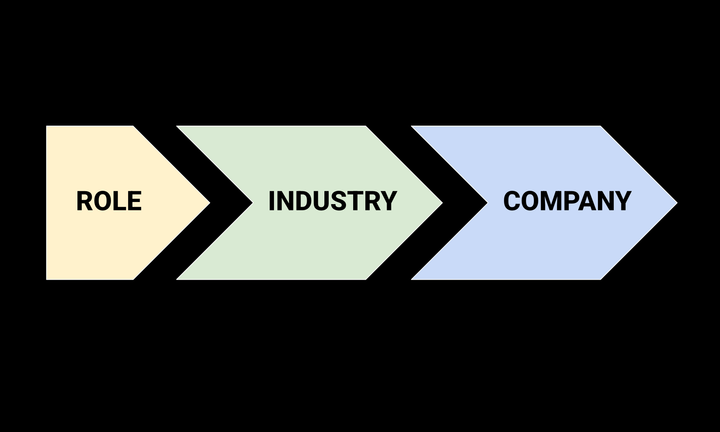The Non-Traditional MBA Advantage: Tips for Navigating Any Market
I remember sitting in my finance class at Ross, surrounded by consultants and bankers tossing around acronyms I'd never heard before. WACC? What?! My background in entertainment felt like a liability. It seemed like everyone else spoke a language I was still learning.

Your non-traditional career path isn't a bug – it's a feature that creates competitive advantages that some "traditional" candidates can't replicate
I remember sitting in my finance class at Ross, surrounded by consultants and bankers tossing around acronyms I'd never heard before. WACC? What?! My background in entertainment felt like a liability. It seemed like everyone else spoke a language I was still learning.
That imposter syndrome was loud. At every networking event, I wondered if I belonged. But here's what I've learned after working with hundreds of MBA candidates and speaking with career services directors across top programs: non-traditional backgrounds aren't weaknesses to overcome – they're competitive advantages that most traditional candidates simply can't replicate.
The myth of the "perfect" MBA background
The conventional wisdom might suggest that consultants and bankers have the ideal pre-MBA profile. "Traditional" candidates speak business language, understand financial modeling, and know how to navigate corporate environments.
However, career services directors see a different reality. Here's what we learned from career directors at some top MBA programs:
"Some healthcare organizations want people without prior experience – to move away from the legacy thinking that is in healthcare today," explains Duke's Ed Bernier. "Personally, I had a stint at Johnson & Johnson with no healthcare background. As a marketer, I brought different skills based on my non-healthcare background."
This line of thinking applies across industries. Non-traditional candidates bring perspectives that homogeneous teams desperately need.... but don't know how to find.
Why different backgrounds create competitive advantages
You think differently about problems
While my classmates knew their way around Excel, my entertainment background taught me to think like an audience. When everyone else saw a business problem, I saw a story problem. That perspective proved invaluable in marketing cases and presentations – skills that matter far beyond traditional "business" roles.
You're comfortable with ambiguity
Traditional candidates often follow prescribed paths. Perhaps they leave an analyst program to join associate program or follow some "known" paths pre- and post-MBA. On the other hand, non-traditional candidates have navigated uncertainty, pivoted when necessary, and built resilience through varied experiences.
When I had to leave my internship early to run my family's publishing business after my dad got sick, I was a week or two short of earning a return offer. I had no idea what my post-MBA career looked like.
When I was interviewing for roles post-MBA, the best I could do was accentuate the positives. I discussed that experience in interviews demonstrated adaptability, leadership under pressure, and real-world business experience in ways that my internship couldn't.
You understand different stakeholder perspectives
Cornell's David Capaldi emphasizes the importance of demonstrated experience: "If you hope to break into VC, there are four key things that can help, in my opinion:
- Experience in investment banking, private equity, or a consulting firm like McKinsey, Bain, or BCG.
- Starting or working at a business where you’ve written a business plan or raised money.
- Strong entrepreneurial experience, helping a business progress or grow.
- A deep understanding of the investment landscape."
Venture capital, by nature, requires a nuanced understanding across multiple stakeholders. Each of these paths can lead into a career in VC – which doesn't necessarily exclude non-traditional candidates from entering.
Specifically, non-traditional candidates often have this real-world experience across diverse contexts. For example, you may have worked with creative teams, managed tight budgets, dealt with difficult clients, or navigated regulatory environments. That stakeholder management experience can translate directly to business.
What career services directors actually see
Non-traditional candidates can outperform in recruiting
"Companies are recognizing that great talent doesn't have to follow one set path," Kies explains about the breadth of recruitment strategies. Career services directors consistently observe that non-traditional candidates who embrace their backgrounds perform well in recruiting because:
- They have genuine passion for their target roles
- They can articulate clear reasons for their career pivots
- They bring unique problem-solving approaches
- They're comfortable standing out rather than blending in
They excel at storytelling
"Students need to articulate not just that they want a job, but exactly what kind of job, in which team, and why," Kies emphasizes about successful candidates.
Non-traditional candidates excel at this because they've had to explain their choices throughout their careers. They're comfortable with the "why" behind their decisions and can connect diverse experiences into compelling narratives.
They bring industry expertise to new sectors
"We're also seeing more companies – especially large, lesser-known ones – actively recruiting at Yale SOM," Kies notes. "Students today are more open to considering roles at these kinds of companies."
Non-traditional candidates can lead this charge because they're not constrained by conventional prestige hierarchies. They evaluate opportunities based on growth potential, learning opportunities, and cultural fit rather than just brand recognition.
Industry-specific advantages
Tech and innovation
Tech companies increasingly value candidates who understand user experience, content strategy, and market dynamics from non-tech perspectives. A former journalist understands content virality. A retail professional understands the journey. A teacher understands user onboarding and engagement.
Healthcare and life sciences
"Healthcare has many flavors: provider, payer, pharma, medical devices, etc. The capabilities that are needed for each of these are different," Bernier explains. Non-traditional candidates can bring patient perspective, regulatory understanding, or operational efficiency insights that others may lack.
Financial services and consulting
My entertainment background may have been invaluable in client services. I understood audience psychology, content strategy, and brand positioning in ways that traditional candidates may have not been exposed to. Those skills proved crucial in business development and client relationship management.
Strategic guidance for non-traditional candidates
Own your story early
Don't apologize for your background – provide some context. Instead of saying "I know I don't have traditional business experience, but..." try "My experience in [industry] taught me [specific skill] that I'm excited to apply to [target role] because..."
Identify your unique value proposition
"Being a participant in an industry doesn't necessarily provide a competitive advantage," Bernier cautions. But having business insights from industry experience absolutely does.
Map your non-traditional experiences to business skills. Here are a few examples:
- Project management under tight deadlines
- Stakeholder communication across diverse groups
- Resource optimization and budget management
- Crisis management and problem-solving
- Customer insight and empathy
Target roles that value your background
The tech industry attracts candidates from all types of industries. However, it can be tough for some to break in. "If you don't have a technical background, you might need to explore roles that allow you to develop that expertise over time," Capaldi advises, "such as product marketing or program management rather than jumping straight into product management."
This principle applies broadly: look for roles where your non-traditional background provides genuine advantage.... rather than trying to fit into traditional boxes.
Leverage your network differently
While traditional candidates compete for the same alumni networks, non-traditional candidates have unique professional networks that many MBA programs can't access in the same way. Use those relationships strategically for informational interviews, industry insights, and job opportunities.
Additional thoughts
Your non-traditional background isn't something to overcome – it's something to leverage strategically – as an applicant, internship / jobseeker, and beyond. The key is shifting your mindset from apologizing for being different to articulating why that difference creates value.
Entertainment taught me to think like an audience. Tech taught me to move fast when things changed. That unexpected detour into family business taught me real leadership under pressure.
Every industry pivot, career change, and unconventional choice has prepared you for the ambiguity and complexity of modern business leadership. Don't minimize that experience – own it!
Laura Nelson transitioned from entertainment to business school at Ross, then built MBA Pathfinders to help other non-traditional candidates navigate their MBA journeys. For more insights on MBA recruiting and career strategy, subscribe to get the latest intelligence delivered to your inbox.


